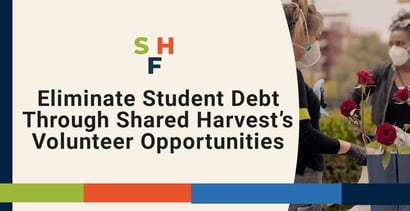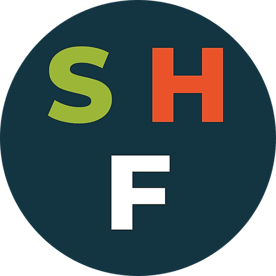
In a Nutshell: Shared Harvest offers borrowers an innovative solution to pay off their student loan debt by volunteering in neighborhoods with the greatest need. Volunteers sign up to work for organizations and earn money that goes directly to pay off student loans — and the majority of the cost is tax deductible. Shared Harvest volunteering opportunities are primarily in the wellness and health care fields, but the organization plans to open up more opportunities around the US. Volunteers match with organizations that fit their passions, and develop skills and valuable experience that put them ahead of peers when looking for a new job.
Student loans are often necessary to get an education and land a high paying job. While that may be true, many people are burdened with ballooning debt that may never be paid off.
Student loan debt has increased dramatically in the last few decades. About 45 million Americans currently owe a combined $1.7 trillion in student loans. Women hold nearly two-thirds of that debt, and because of the gender pay gap, they are more likely to struggle to pay back their debt.
A study on the student debt crisis by the nonprofit The Education Trust, which works to close opportunity gaps that disproportionately affect students of color and students from low-income families, found that Black women are most negatively affected by student loans because of systemic racism and the inequitable distribution of wealth.
The study found that, because Black women make less money, they often need to borrow more to cover the cost of attendance and struggle to pay their debt back. This is an issue Dr. Nana Afoh-Manin hoped to solve to level the playing field for all students.
Dr. Afoh-Manin founded and developed Shared Harvest, a platform that allows people with student debt to use their skills to help others while making significant strides in paying back student loans. The organization started four years ago as a volunteer management solution and evolved into a workforce wellness and independent community-based health corps in order for individuals and employers to get involved in loan forgiveness opportunities for their workforce while measuring tangible community impact.
“We wanted to eliminate the shackles of student loan debt while helping people do good for their communities,” Dr. Afoh-Manin said. “The way we thought that would work is by creating a Peace Corps in our own backyards and giving borrowers the agency to choose how and when they want to serve.”
Providing Hope to Pay Off Student Loans
The world is in need of experienced volunteers who can better the situations of people who don’t have access to resources others take for granted everyday. But many people with student debt see the possibility of volunteering as remote or even nonexistent.

Many with high student debt cannot afford to leave their families and career behind to volunteer, especially if they have to travel overseas. Shared Harvest built its program around those who want to volunteer their skills and experience but are burdened with student loan debt.
Shared Harvest’s platform uses technology to create solutions to the student debt crisis and improve the health of people living in high risk areas. Communities in need benefit from volunteers who deliver critical services.
Nonprofit organizations partner with Shared Harvest to source volunteers for health equity projects and other initiatives. In return, volunteers earn reward points every time a project is completed.
Volunteers convert reward points into student loan repayments. Shared Harvest makes the payments directly to student loan providers so there’s no tax burden on it.
Dr. Afoh-Manin and her team helped create a solution in an area that lacked development. She said that, although a college degree used to be a way for people to elevate their financial status and level the playing field, student debt is creating income gaps and affecting communities of color.
“It’s sadly one of the biggest crises for the generation,” Dr. Afoh-Manin said. “We’re talking about development and progress. It doesn’t get credit for just how bad it is.”
As inflation continues to rise, it’s making it harder for families to pay the bills. The student loan repayment moratorium currently in place is not making loans go away, and borrowers will have to make payments once the moratorium is lifted.
When payments restart, families may not be able to make ends meet. Dr. Afoh-Manin said people she’s spoken to want to do more but feel like they can’t because of student debt.
“If you can give people a little, you elevate them a whole lot,” Dr. Afoh-Manin said. “You get them to think and be hopeful about how to remove this burden in more creative ways and contribute meaningfully to society. We have a lot of work to do to create a more perfect union and we need all of us in this together, equally.”
Continuing to work with Shared Harvest has led to huge loan payoffs for volunteers. Shared Harvest’s network partners recognize the volunteer work being done and often help those volunteers with loan forgiveness.
“Some people who were in our program who were just getting maybe $100 to $500 a month,” Dr. Afoh-Manin said. “All of a sudden they got a call and were told that $20,000 was forgiven on their loan. That’s huge.”
Matching Volunteers to Causes They Care About
The pandemic has changed everyday life. And many people have had to adjust to change, including completely changing careers.

Dr. Afoh-Manin and two other founders of Shared Harvest experienced the impact of Covid-19 first hand as emergency room doctors. Dr. Afoh-Manin said they realized there had to be a better way to get help to communities that need it most.
“We saw what Covid-19 was doing, especially in the African American community,” Dr. Afoh-Manin said. “We saw this real, desperate need to get out even more into a community and get those real resources to people. And let them know that they aren’t alone.”
Shared Harvest got its start by supporting health professionals with a free public telehealth platform. That project alone enabled Shared Harvest to pay off $120,000 of student debt across the board for its volunteers.
As the pandemic slowly begins to dissipate, Shared Harvest is following up that program with what it calls Project #RESUS. Project #RESUS is aimed at improving the lives of health providers and strengthening the medical provider pipeline. It offers wellness resources and student loan relief to help allied health professionals who have been affected by mental devastation during Covid-19, yet continue to be important contributors to the public health crisis.
Volunteers who sign up with Project #RESUS are guaranteed to earn $1,000 a month for the service they provide. If they continue with the program for three years, they are eligible for $100,000 in relief total.
More nonprofits are also opening up to receive support from Shared Harvest volunteers as Covid-19 restrictions continue to ease up. Volunteers will get to choose three of 17 sustainable development goals they want to participate in so they are helping where their impact is felt most.
Building Sustainable Success With Skill Development
Shared Harvest is about creating opportunities for people to eliminate their student loan debt and give them hope toward a brighter future. In addition to helping reduce their student debt, Shared Harvest’s projects teach volunteers critical skills employers look for.
Volunteers who are passionate about their projects are often offered a full-time position with the nonprofit organization, Dr. Afoh-Manin said. Shared Harvest looks to create more stories like that and opens its platform to companies that want to blend student loan repayment with philanthropy. Even people with hundreds of thousands of dollars in student debt can find hope.
“We are a nation who values education,” Dr. Afoh-Manin said. “We have to show that we value it by providing some relief to the level of people who are committed to the journey.”
Students can earn from $125 to $500 for a volunteering project. The maximum a volunteer can earn a year is $12,500 per year or be the lucky person to receive that jubilee phone call, with all of it going toward debt relief.
There are also opportunities for private philanthropists to get in on large-scale forgiveness. Shared Harvest gives away about $25,000 in larger forgiveness every quarter and encourages sponsors from all sectors to partner with them to ease the burden in a big, sustainable, and measurable way.
People without student loan debt can also volunteer and either give their credits to others to help them pay off loans or turn their credits in for other prizes like travel or gift certificates.
Shared Harvest’s social enterprise for-profit and nonprofit sides work together to make volunteering more accessible and valued. They are elevating the culture of skills based volunteering.
With a primary focus on recruiting young and seasoned adults who are valuable influencers in the community, Shared Harvest aims to partner with nonprofits and build tailored opportunities for the volunteer and place them where they want to be, whether they are paying off student loans or redeeming for other rewards.






